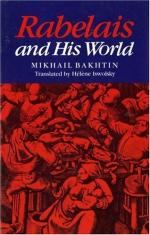|
This section contains 1,204 words (approx. 4 pages at 400 words per page) |

|
Humor
The role of laughter and humor is incredibly important throughout this book. The author refers to the role of laughter and comedy through changing cultural forms. During the Middle Ages and the Renaissance, the folk culture, the culture of the lower classes, contains much vulgarity. Food, sex and politics are all fair game.
The comedy of the carnival is connected with other comic forms: the parody and the satire. Satire is taken so seriously, that the author describes an incident where there is conflict because someone who is not culturally sanctioned to wield enough power to put together and run a public satire dares to do so anyway.
The author does not explain who organizes carnival, but only informs readers that this is a folk tradition in which comedy and laughter are strongly encouraged and has many forms. The entire ethos is extroverted and life-affirming. There is an...
|
This section contains 1,204 words (approx. 4 pages at 400 words per page) |

|




